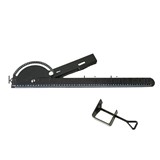Executive Director Michael Campbell says the guides will particularly benefit employers with limited workplace relations or human resource management experience.
They will build upon a range of fact sheets and other material and information already provided by the Fair Work Ombudsman to inform and educate employers and employees of their legal obligations under the Act.
This information can be accessed via the Fair Work Ombudsman website at www.fwo.gov.au. Employers are also encouraged to contact the Infoline on 13 13 94 between 8am and 6pm Monday to Friday for assistance.
“With this latest initiative, we have sought to explain in simple language the concepts of best practice in key areas which can promote harmonious, productive and co-operative workplaces,” Campbell said.
The new guides cover Work & Family, Consultation & Co-operation, Individual Flexibility Arrangements, Employing Young Workers, Gender Pay Equity, Small Business, Workplace Privacy, Managing Under-performance, Effective Dispute Resolution and Improving Workplace Productivity in Bargaining.
A guide for young workers has also been prepared, outlining things young people need to know before they start work and after they take a job, including protections against harassment and discrimination and the right to join or not to join a union.
The Fair Work Ombudsman’s Practice Guides cover the following topics:
- Work & Family
Fostering a culture of workplace flexibility for family responsibilities can help to achieve a more productive work environment. From reduced absenteeism to improved job satisfaction, there are significant benefits for employees and employers in achieving a work and family balance.
- Consultation & Co-operation in the Workplace
Best practice workplace consultation involves developing and implementing effective consultation mechanisms which encourage cooperation and the engagement of employees and management across the workplace. Employee involvement in decision-making regularly leads to benefits such as increased productivity and greater collaboration.
- Individual Flexibility Arrangements (IFAs)
Flexible work practices can deliver benefits to both employers and employees. Individual flexibility arrangements can lead to greater job satisfaction and help attract and retain skilled and valuable staff. Flexibility in the workplace can also improve workplace productivity and efficiency by helping maintain a motivated workforce with reduced staff turnover and absenteeism.
- A Guide for Young Workers
It can be an exciting time for a young person when they get their first job. Knowing and understanding their workplace obligations and entitlements can assist young workers navigate their way through the employment process.
- An employer's guide to employing young workers
Young workers can bring enthusiasm and new skills to a workplace. They can also become loyal and valuable employees. Best practice employers understand their obligations to young workers and recognise that their guidance and support can shape young employees’ futures and their attitudes to work.
- Gender Pay Equity
Gender pay equity is about ensuring that both women and men are paid fairly for the work they perform. Gender pay equity makes good business sense because it fosters fairness and respect, which helps to create a motivated and harmonious workforce.
- Small Business
The Fair Work Act 2009 sets out a number of requirements that business, including small business, needs to be aware of. Best practice employers know and understand their rights and obligations under workplace law and know who to contact for assistance.
- Workplace Privacy
Operating at best practice when it comes to workplace privacy creates trust, certainty and security for both employers and employees. Employers, employees and their representatives need to know what information may be collected and retained by employers and whether it can be passed on to others.
- Managing Underperformance
Establishing effective performance management systems can have significant benefits for a business, leading to happier, more motivated and better performing employees. Reviewing, refining and implementing performance management systems are ways of helping achieve these benefits.
- Effective Dispute Resolution
Disputes can arise in any workplace. A dispute exists when one or more people disagree about something and matters remain unresolved. A fair and balanced dispute resolution process is important for the effective operation of any business.
- Improving Workplace Productivity in Bargaining
Enterprise bargaining is a way of fostering a culture of change in the workplace and is a valuable tool in the process of continuous improvement. It can assist in the creation of responsive and flexible enterprises and help to improve productivity and efficiency.
- Suppliers
- New to IndustrySearch? Book a Demo
- Advertise with us
- Login
- Email Marketing
- Buyers
- Get Quotes
- Articles & Ideas
- Login
- Subscribe to newsletter
- My Details
- Get Quotes
- Automation & Control
- Automotive Workshop Equipment
- Commercial Cleaning Equipment & Supplies
- Construction Equipment & Heavy Machinery
- Conveyor Systems & Components
- Electrical & Power Generation Equipment
- Electronic Components
- Farming & Agriculture
- Food & Beverage Processing
- Forklifts & Forklift Attachments
- Hydraulic & Pneumatic Equipment
- Industrial Materials, Tools & Components
- Industrial Pumps
- IT Hardware & Industrial Computing
- IT Software & Applications
- Laboratory Equipment & Instruments
- Manufacturing & Industrial Equipment
- Material Handling & Lifting Equipment
- Metalworking & Machining
- Mining Equipment & Machinery
- Packaging & Labelling Machinery
- Pallet Handling Equipment
- Personal Protective Equipment
- Security & Surveillance
- Test & Measurement
- Transport & Logistic Equipment
- Warehouse Storage, Shelving & Racking
- Waste Treatment & Environmental Management
- Welding Machines & Accessories
- Woodworking & Joinery Machines
- Workplace Equipment
- Workplace Safety Equipment
- Get Quotes
- Automation & Control
- Automotive Workshop Equipment
- Commercial Cleaning Equipment & Supplies
- Construction Equipment & Heavy Machinery
- Conveyor Systems & Components
- Electrical & Power Generation Equipment
- Electronic Components
- Farming & Agriculture
- Food & Beverage Processing
- Forklifts & Forklift Attachments
- Hydraulic & Pneumatic Equipment
- Industrial Materials, Tools & Components
- Industrial Pumps
- IT Hardware & Industrial Computing
- IT Software & Applications
- Laboratory Equipment & Instruments
- Manufacturing & Industrial Equipment
- Material Handling & Lifting Equipment
- Metalworking & Machining
- Mining Equipment & Machinery
- Packaging & Labelling Machinery
- Pallet Handling Equipment
- Personal Protective Equipment
- Security & Surveillance
- Test & Measurement
- Transport & Logistic Equipment
- Warehouse Storage, Shelving & Racking
- Waste Treatment & Environmental Management
- Welding Machines & Accessories
- Woodworking & Joinery Machines
- Workplace Equipment
- Workplace Safety Equipment
Trusted by 1,000,000+ Australian industrial buyers
Buyers
- Discover products & solutions
- Login
- Subscribe To Newsletter
- Browse All Products
- Read Articles
Suppliers
Advertise
- Promote your products & solutions
- New to IndustrySearch? Book a Demo
- Login / Forgot Password
- Advertise Your Products
- Success Stories
- Email Marketing
- Suppliers
- Advertise with us
- Login
- Email Marketing
- Buyers
- Get Quotes
- Articles & Ideas
- Login
- Subscribe to newsletter
- My Details
Get Quotes
- Automation & Control
- Automotive Workshop Equipment
- Commercial Cleaning Equipment & Supplies
- Construction Equipment & Heavy Machinery
- Conveyor Systems & Components
- Electrical & Power Generation Equipment
- Electronic Components
- Farming & Agriculture
- Food & Beverage Processing
- Forklifts & Forklift Attachments
- Hydraulic & Pneumatic Equipment
- Industrial Materials, Tools & Components
- Industrial Pumps
- IT Hardware & Industrial Computing
- IT Software & Applications
- Laboratory Equipment & Instruments
- Manufacturing & Industrial Equipment
- Material Handling & Lifting Equipment
- Metalworking & Machining
- Mining Equipment & Machinery
- Packaging & Labelling Machinery
- Pallet Handling Equipment
- Personal Protective Equipment
- Security & Surveillance
- Test & Measurement
- Transport & Logistic Equipment
- Warehouse Storage, Shelving & Racking
- Waste Treatment & Environmental Management
- Welding Machines & Accessories
- Woodworking & Joinery Machines
- Workplace Equipment
- Workplace Safety Equipment
Get Quotes
- Automation & Control
- Automotive Workshop Equipment
- Commercial Cleaning Equipment & Supplies
- Construction Equipment & Heavy Machinery
- Conveyor Systems & Components
- Electrical & Power Generation Equipment
- Electronic Components
- Farming & Agriculture
- Food & Beverage Processing
- Forklifts & Forklift Attachments
- Hydraulic & Pneumatic Equipment
- Industrial Materials, Tools & Components
- Industrial Pumps
- IT Hardware & Industrial Computing
- IT Software & Applications
- Laboratory Equipment & Instruments
- Manufacturing & Industrial Equipment
- Material Handling & Lifting Equipment
- Metalworking & Machining
- Mining Equipment & Machinery
- Packaging & Labelling Machinery
- Pallet Handling Equipment
- Personal Protective Equipment
- Security & Surveillance
- Test & Measurement
- Transport & Logistic Equipment
- Warehouse Storage, Shelving & Racking
- Waste Treatment & Environmental Management
- Welding Machines & Accessories
- Woodworking & Joinery Machines
- Workplace Equipment
- Workplace Safety Equipment
Trusted by 1,000,000+ Australian industrial buyers



